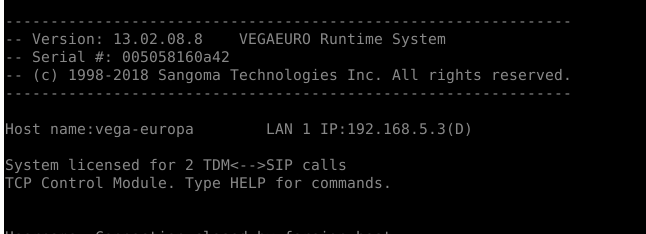Hi all, I have been trying to fix this for days, I am aware that my knowledge about ip-telephony and Asterisk is very little, however most of times I am able to apply fixes based on solutions that I find on the forum, but this particular case it’s driving me crazy, I have this setup:
POTS → Vega 50 → Asterisk
I am using the vega 50 as fxo gateway, in asterisk I only have one default incoming route from this trunk and one default outgoing route to this trunk and I always receive the call to extension as Anonymous, I never get the caller ID, and I know for fact that the analog line works because if I plug an analog phone straight to the modem, I can receive calls with caller ID as normal.
I am attaching full traces from vega and from asterisk of one test call, here is the first line with the word “Anonymous” that I can find:
Asterisk:
ExecIf(“PJSIP/Vega-0000000d”, “9?Set(FROMEXTEN=Anonymous)”) in new stack
Vega:
From: “Anonymous” sip:[email protected];tag=0016-01A0-CB6D1DF4
I think (but I can be wrong) that somehow the vega is causing this.
I enabled debug on vega while making the test call but the output was this only:
admin >debug on
debug to this console = enabled
LOG: 14/04/2024 04:54:42.327 POTS (I)R01Cab incoming
call ref=[f10000d6] srce= [0]
LOG: 14/04/2024 04:54:42.345 ROUTER (I)R0bC00 FINDROUTE profile:20(To_SIP) plan:2
call ref=[f10000d6] ← POTS [9,1] dest=
→ SIP [2,1] dest=TEL:0201
LOG: 14/04/2024 04:54:42.345 ROUTER (I)R0bC00 call proceeding
call ref=[f10000d6]
LOG: 14/04/2024 04:54:51.410 SIP (I)R03C13 connect g711Ulaw64k (Profile 1 - Voice)
call ref=[f10000d6]
LOG: 14/04/2024 04:55:00.962 SIP (I)R04C13 disconnect(disc ind) 16
call ref=[f10000d6]
LOG: 14/04/2024 04:55:00.980 POTS (I)R05Cab disconnect call cause 16
call ref=[f10000d6]
admin >debug off
debug to this console = disabled
admin >
I am also attaching the sngrep capture from asterisk:
traces.tgz (5.9 KB)
capture.pcap.tgz (1.8 KB)
I have read many posts with similar problem, some of them are marked as solved but when I try the solution it does not work for me.
I do really appreciate your reply.
Aldo

